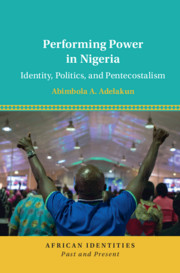Book contents
- Performing Power in Nigeria
- African Identities: Past and Present
- Performing Power in Nigeria
- Copyright page
- Dedication
- Contents
- Acknowledgments
- Introduction: Power Identity: Politics, Performance, and Nigerian Pentecostalism
- 1 Demons and Deliverance: Discourses on Pentecostal Power
- 2 “What Islamic Devils?!”: Power Struggles, Race, and Christian Transnationalism
- 3 “Touch Not Mine Anointed”: #MeToo, #ChurchToo, and the Power of “See Finish”
- 4 “Everything Christianity/the Bible Represents Is Being Attacked on the Internet!”: The Internet and Technologies of Religious Engagement
- 5 “God Too Laughs and We Can Laugh Too”: The Ambivalent Power of Comedy Performances in the Church
- 6 “The Spirit Names the Child”: Pentecostal Futurity in the Name of Jesus
- Conclusion: Power Must Change Hands: COVID-19, Power, and the Imperative of Knowledge
- Select Bibliography
- Index
5 - “God Too Laughs and We Can Laugh Too”: The Ambivalent Power of Comedy Performances in the Church
Published online by Cambridge University Press: 29 October 2021
- Performing Power in Nigeria
- African Identities: Past and Present
- Performing Power in Nigeria
- Copyright page
- Dedication
- Contents
- Acknowledgments
- Introduction: Power Identity: Politics, Performance, and Nigerian Pentecostalism
- 1 Demons and Deliverance: Discourses on Pentecostal Power
- 2 “What Islamic Devils?!”: Power Struggles, Race, and Christian Transnationalism
- 3 “Touch Not Mine Anointed”: #MeToo, #ChurchToo, and the Power of “See Finish”
- 4 “Everything Christianity/the Bible Represents Is Being Attacked on the Internet!”: The Internet and Technologies of Religious Engagement
- 5 “God Too Laughs and We Can Laugh Too”: The Ambivalent Power of Comedy Performances in the Church
- 6 “The Spirit Names the Child”: Pentecostal Futurity in the Name of Jesus
- Conclusion: Power Must Change Hands: COVID-19, Power, and the Imperative of Knowledge
- Select Bibliography
- Index
Summary
This chapter, “God Too Laughs and We Can Laugh Too”: The Ambivalent Power of Comedy Performances in the Church, investigates the trend in Nigerian Pentecostal churches where comedians intersperse various church programs with comedy performances. In this chapter, I look at performance of power beyond acquisition and contestation to how power identity of an authority figure can be affirmed publicly and contested privately. Comedy performance has consistently been treated as a site of resistance by the marginalized subject, but my study of comedy in Pentecostal churches shows some complications in this functionalization of the art form. Using both ethnographic methods in my fieldwork with various interviews with “gospel comedians” (as some refer to themselves), I consider exchanges that constitute power identity whose radicality is not found in the public sites but in the backrooms where negotiations take place between the artist and the producers.
- Type
- Chapter
- Information
- Performing Power in NigeriaIdentity, Politics, and Pentecostalism, pp. 176 - 207Publisher: Cambridge University PressPrint publication year: 2021

